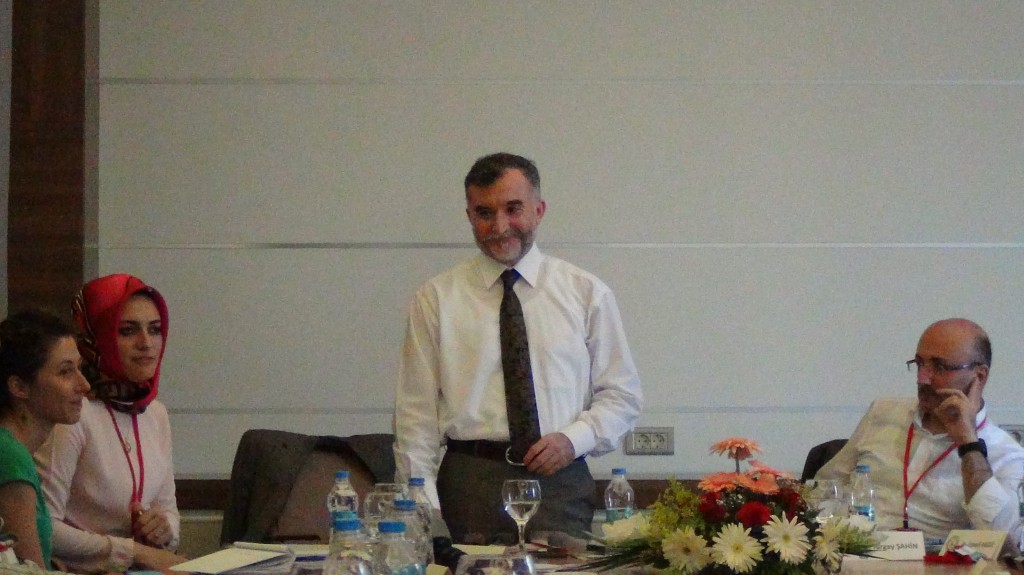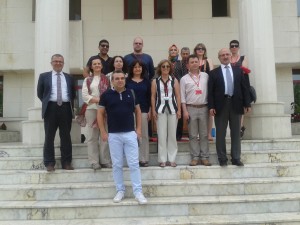Turkish national meeting, the role of remittances in the dynamics of the transnational families.
 The fourth national meeting of the Grundtvig project “Advanced Training Programme on Transnational families Support” took place in June in Afyon, Turkey. The meeting was organized by Afyonkarahisar Barosu to discuss the role of remittances in the dynamics of the Transnational Families.The hosting organization made an in depth country analysis of Turkish migration in the last decades . Turkey is a country particularly affected by migration phenomenon, in fact, although it decreased in the last decade thanks to the economic growth, 3 millions of Turkish citizens reside abroad, mainly in Europe and Middle East. Mr. Ahmet Sahbaz, a regional expert of migration, evaluated the consequences of migration on the Turkish society. He affirmed that migration enriched the country from an economic and cultural point of view: Turkey made huge steps forward in the field of health, education and environment although the contamination with different cultural produced changes in life style and values.
The fourth national meeting of the Grundtvig project “Advanced Training Programme on Transnational families Support” took place in June in Afyon, Turkey. The meeting was organized by Afyonkarahisar Barosu to discuss the role of remittances in the dynamics of the Transnational Families.The hosting organization made an in depth country analysis of Turkish migration in the last decades . Turkey is a country particularly affected by migration phenomenon, in fact, although it decreased in the last decade thanks to the economic growth, 3 millions of Turkish citizens reside abroad, mainly in Europe and Middle East. Mr. Ahmet Sahbaz, a regional expert of migration, evaluated the consequences of migration on the Turkish society. He affirmed that migration enriched the country from an economic and cultural point of view: Turkey made huge steps forward in the field of health, education and environment although the contamination with different cultural produced changes in life style and values.
Then, Afyonkarahisar Barosu presented the study “Impact of the remittances of transnational families on the Turkish economy“ in a round table with the participation of migration experts .
Remittances, the transfer of money sent by migrant workers to the country of origin, are fundamental source of external funding for developing country. Analyzing the effects of remittances on Turkish economy, it is evident that if from one side they financed part of the public deficit, they increased liquidity and enhanced import capacity; nevertheless, from the other side, remittances produced some negative aspects too, influencing the exchange rate of the Turkish Lira and fostering inflation.
In the last decade, as a annual average, has been sent 3 billion dollars from migrants abroad. The amount of foreign capital flow reached a peak in the 1970-74 when it constituted the 4% of the GDP meanwhile in the last years it was reduced due to the integration of second and third generation.
The study analyzed the determinant of the remittances. First of all, microeconomic factors that influence migrant behavior were presented: time passed abroad, income of the family, work experience and marital status. Other studies pointed out individual reasons for sending remittance and special agreement with the family left behind. Since the improvement of family welfare is usually one of the main cause that foster people to migrate, remittance become fundamental sustain for household . Within macroeconomic determinant influencing foreign capital flow could be identified: the number of migrants, the income level, the economy situation of both the country of origin and the host country, for example high inflation rates affects severely the welfare of the family and foster remittances from foreign countries.
Governments could facilitate capital flow through special policies: tax exemption for remittances income, improve access to bank services. Turkey disposes of an efficient financial structure for remittances, in particular the Central Bank of the Republic of Turkey facilitated and promoted the remittances inflow through different transfer modalities, such as the online passing trade system or the transfer from collective account.
Turkish Government undertook two actions to foster fruitful investment of migrant capital flow. In 1962 was launched the programme “Village Development Cooperatives “ where migrants were engaged to finance projects for the development of their home town, secondly, they promote the programme “Workers Joint Stock Companies” which aims to foster industrialization and to create new job opportunities in the most deprived areas of the country. Both initiative failed for lack of managerial abilities and scarce public support.
Foreign capital flow do not boost employment and neither investments, nevertheless it is possible to affirm that it improve transnational families welfare, as savings are mainly used for basic consumption needs, helping to reduce poverty and inequality. Although there are not sufficient data to analyze how they influenced children education or health, it is assumed to have positive impacts on social development aspects.
The effectiveness of remittance on transnational families standard of living is strictly related to migration patterns. For example, In Turkey , where migration is characterized by men living the family behind, normally is the wife who manages savings investing them for the household, or eventually they are invested in real estate.
In other European countries like Bulgaria, Romania and Poland migration is characterized also by women living the families behind, playing a fundamental role for the domestic economy . In the cases of children left behind is the minor that manage the domestic economy, and often the materialistic aspect of parents- child relationship tend to be overestimated by migrant parents. Children receive goods and money but they have not the skills to managed them properly. As reported by Alternative Sociale, children rarely feel satisfied with the improvement of living standard.
Polish Migration Forum presented a research on remittances in Europe. After presenting the main patterns of migration in Poland, they compared the impact of remittances in Eastern European countries: for example, a major economic impact of remittances is in Bulgaria, Lithuania, Latvia and Romania. Some characteristics found in the Turkish study, appear also in PFM presentation: remittances do not foster investments and employment but they are used for everyday day purchase so that a cut in the remittances inflow brings also to an impoverishment of family left behind. Furthermore, studies show that the amount of capital flow from migrants decrease with time, first because family could join the migrant in the hosting countries and secondly because some of the families fall apart due to separation.
The meeting was an important moment to focus on the economic aspect of migration and to analyze the consequences it produces in the dynamics of transnational families. Finally, Afyonkarahisar Barosu facilitated an intercultural exchange with Grundtvig partners presenting the most representative historical places and offering a genuine overlook of Turkish culture and tradition.

